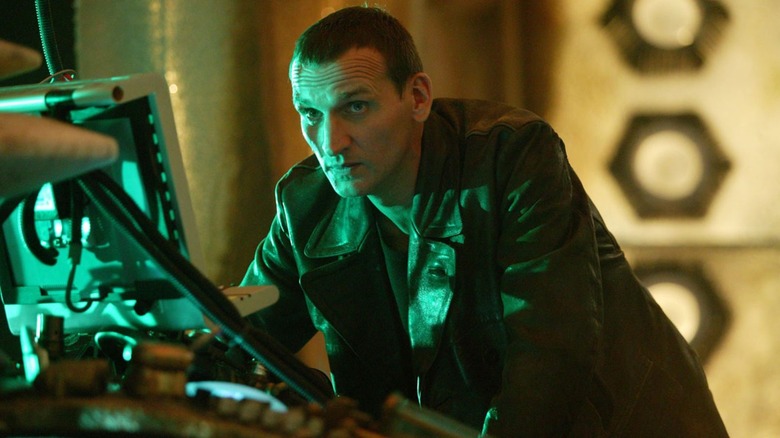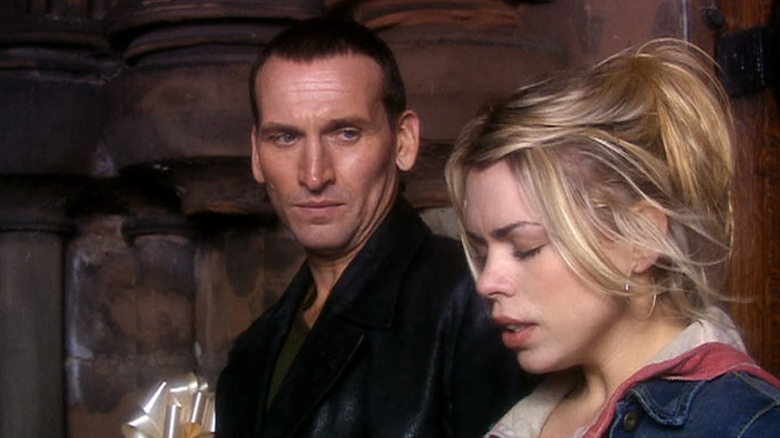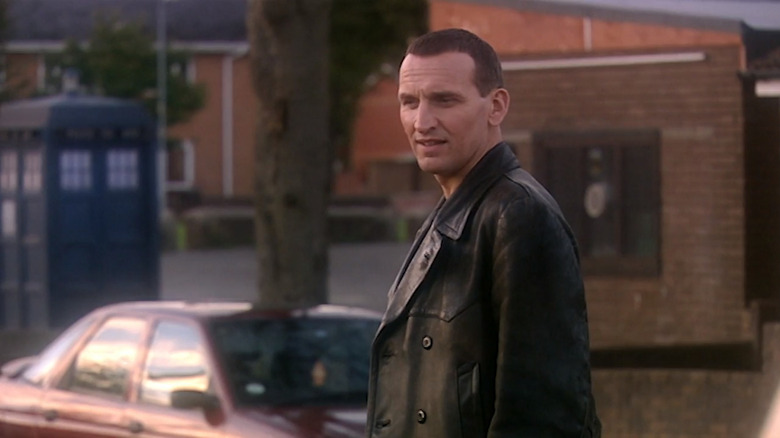Russell T. Davies Had One Rule When It Came To Reinventing Doctor Who
As the hype grows around the casting of the next Doctor — "Sex Education" star Ncuti Gatwa – it seems almost inevitable now that the "Doctor Who" revival was always going to be a massive success. But over 17 years ago, when writer/producer Russell T. Davies was first in talks to bring the show back from the dead, it didn't seem like a sure bet at all. The 1996 made-for-TV movie with Eighth Doctor Paul McGann was not a success, and it was starting to seem like "Doctor Who" was simply a relic of the 20th century, too slow-paced and too cheaply-produced to appeal to modern viewers.
But as any Whovian could tell you, "Doctor Who" was very much capable of reaching modern audiences. The revival was faster-paced, with a season-long story arc connecting many of the episodic adventures by the end. It also leaned into the possibility of a Doctor/companion romance, which the classic show had rarely bothered with. And although the special effects often left a bit to be desired, it was still far more impressive than the wobbly sets previous Doctors had to deal with.
But the real key to the show's success, perhaps more so than anything else, was the big rule Davies stuck to from the get-go: the Doctor couldn't be posh.
A working class Doctor
As future "Doctor Who" showrunner Steven Moffat put it in a two-way interview with Davies, "All the original Doctors are posh except Sylvester (in performance, I mean, not upbringing), so how could you be so sure?" Davies responded by clarifying that he wasn't actually as sure as he likely seemed at the time: "If I sounded certain, I was bluffing."
His full answer had to do with his theory on why classic episodes of the show never seemed to work for modern viewers in the same way that classic episodes of "Star Trek" do. Some of that, he figured, had to do with the old-fashioned poshness of most of the classic Doctors:
"A man in a frock coat — why the posh coat? An Edwardian? A Victorian? Why? Once you start to ask why, there's no great answer."
His approach to season 1 — and the rest of his era, really — was to firmly root the show in working class characters. Whereas most of Moffat's eventual companions seemed strangely removed from any real-life financial concerns, season 1 centered around Rose Tyler (Billie Piper), someone from a working class family. Rose was a retail worker who couldn't afford to travel much before the Doctor came along, and this was an important motivator behind the character's choices throughout her time on the show.
Davies acknowledged that they could've mined some humor and drama out of a posh Doctor interacting with Rose's working class family, but ultimately dismissed the idea:
"Okay, a posh man could drop into that, and the differences would be hilarious. But he's got enough differences! He's an alien, he's a time-traveler, he's 900 years old. Amazing! Next to that, posh seems thin. Like you're reaching for differences instead of looking to the ones that exist."
Eccleston's one-of-a-kind performance
"In the end," Davies said, "I just thought a tough, war-damaged veteran in an old leather jacket was the right fit for 2005. Instinct, that's all." His instincts have long been vindicated, because Christopher Eccleston ended up giving one of the most memorable and impressive performances of all the modern Doctors. His grumpier, more down-to-earth take on the character has ensured that his tenure is held in high regard, despite how short it ended up being.
One of his standout performances was in his sixth episode "Dalek," where he was confronted with one of the most famous aliens of classic "Doctor Who" for the first time since the Time War. This is the Ninth Doctor at his most angry and his most guilt-ridden, and it hits all the harder because there are no posh pretensions shielding us from the most severe of his emotions. It's a raw performance that not only reveals a lot to new viewers, but manages to make a Dalek (one of the Doctor's goofiest enemies) feel genuinely threatening.
A working class-styled Doctor also highlights where Nine was mentally at this point in his life. He was a tired, world-weary Doctor who didn't have much energy for fancy scarfs or hats. Throughout the season, his adventures with Rose — implied to be his first companion since the Time War — helped him regain more of his optimism and his love for life. It paved the way for Tennant's more eccentric (though still relatively understated) outfit and demeanor.
Davie's rejection of poshness was a defining aspect of his tenure, although it's not yet clear if he'll stick to it when he returns as showrunner in 2023. Perhaps he'll reinvent the show all over again. After all, we already know he's capable of pulling it off.


